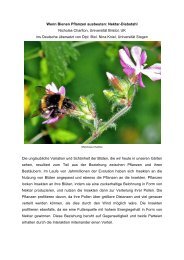PhDâ€theses - Ethologische Gesellschaft
PhDâ€theses - Ethologische Gesellschaft
PhDâ€theses - Ethologische Gesellschaft
Create successful ePaper yourself
Turn your PDF publications into a flip-book with our unique Google optimized e-Paper software.
Research Update<br />
WHO DETERMINES THE END OF BROOD CARE IN THE ZEBRA FINCH (TAENIOPYGIA GUTTATA)?<br />
Inka Spiller<br />
inka.spiller@uni‐oldenburg.de<br />
Bachelor Thesis, Supervisor: Fritz Trillmich & Tobias Krause; Dept of Animal Behaviour, University of<br />
Bielefeld<br />
A long‐standing question concerns the ending of brood care in mammals and birds: This is<br />
supposed to lead to parent‐offspring conflict, with parents selected to end care earlier than<br />
offspring would like. Who decides in this: parent(s) or offspring? I studied this question in an<br />
altricial birds, the Australian zebra finch (Taeniopygia guttata) by cross–fostering young of<br />
different ages. In one treatment the parents received 3 ‐ 15 days younger chicks and in the<br />
other chicks that were 3 ‐ 7 days older than their own. In addition, there were two control<br />
groups: In the first, parents were permitted to rear their own chicks and in the second they<br />
received cross‐fostered chicks of the same age (+/‐ 2 days).<br />
Parents extended brood care when they received younger chicks and shortened it<br />
when getting older ones. Young always fledged when about 18‐20 days old, independent of<br />
treatment and at the same time as the two control groups. To determine whether parents<br />
stop feeding when chicks present stimuli normally shown by 19 day old young, I kept young<br />
of 5 broods artificially for up to 6 days longer in the nest. These young were equally fed by<br />
the parents. The results demonstrate unequivocally that young determine the age of<br />
fledging.<br />
After fledging, parents fed chicks of all treatment groups for approximately the same<br />
duration whether they had received older, younger, or equal‐aged chicks. Also the ones that<br />
had been fed in the nest for longer than normal were fed outside the nest for about the<br />
same period. My results demonstrate that in this altricial bird young determine the age at<br />
fledging and increased time of brood care in the nest does not shorten parental care after<br />
fledging. Thus there is little evidence for parent‐offspring conflict.<br />
22



